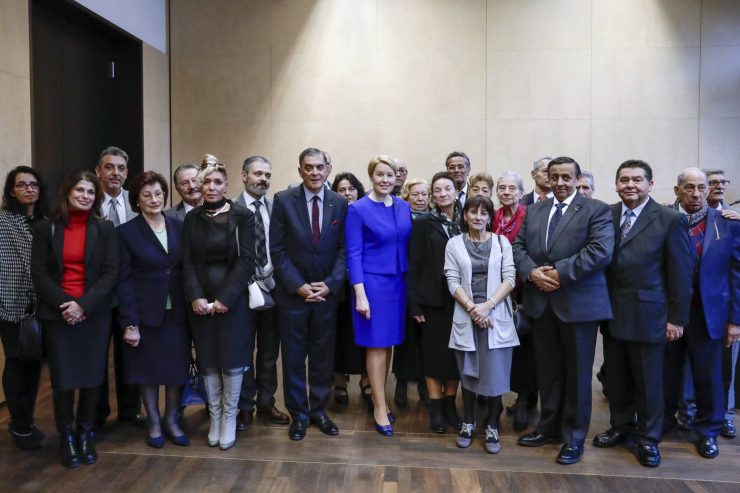
Today, the “Federal-Laender Agreement on the Preservation of the Graves of Sinti and Roma Persecuted under the National Socialist Dictatorship” is signed by Federal Minister Dr. Giffey for the federal government. Minister Giffey signs the agreement following the ceremony in the Federal Council of the German Laender on the annual commemoration of the Nazi genocide of the Sinti and Roma. Previously, on 5th of December, 2018, the Prime Ministers of the Federal States signed the agreement during their last conference in Berlin.
With this agreement, the decision on the permanent preservation of tombs, passed by the Federal Chancellor and the heads of governments of the Länder on 8 December 2016, has now been transposed into a nationwide regulation, which enters into force with today’s signing.
At the signing ceremony of this agreement participated the President of the Federal Council Daniel Günther, Federal Minister Franziska Giffey, and the Chairman of the Central Council of German Sinti and Roma, Romani Rose. The ceremony joint as well the Federal States’ Prime Ministers, representatives of the two major churches and the city council, the directors of the Central Council and its national associations as well as survivors of the Holocaust.
“After the long negotiations of the Central Council of German Sinti and Roma with the Federal Government, the States and the Local Authorities, today is a historic date for the Central Council and for the entire minority. With this agreement, the graves of survivors of the Nazi genocide will be permanently preserved in communities and towns as family heritage sites and as public learning locations for future generations. With the preservation of the tombs, the honourable commemoration of our people, who were persecuted and murdered under National Socialism, is preserved and reminded of the grave fate of our minority under the Holocaust, “said the Chairman of the Central Council, Romani Rose, today.
“I would like to express my gratitude to the Federal Chancellor and all the Prime Ministers of the Federal States and particularly to the German Cities Council as well to both major churches who have supported us concertedly for this important matter. I would particularly like to thank the Federal Minister Dr. Giffey and the staff of her house, who have led the complex negotiations to this good result”, said Rose furthermore.
For the families of the Sinti and Roma, the permanent preservation of the tombs as family memory sites and as protected memorial sites is of great importance, also because there is nowhere to be a grave site for most of their members murdered during National Socialism. At the same time, these tombs are places of historical importance and, due to their special history, public learning places, especially where special grave inscriptions and tablets point out the fate of those buried. In this respect, their preservation is not only in the interest of the affected families, but is a fundamental contribution to political education work and the German remembrance culture.
“Our graves are the last vestiges of those who survived the horrors of the Holocaust. They are witnesses to the genocide of the Sinti and Roma and, as such, a legacy of our democracy and our rule of law, “said the head of the Central Council.
The Federal Government and the States share the costs for the preservation of the graves. The Federal Government ensures administrative implementation by the Federal Office for Central Services and Open Property Issues (BADV).



